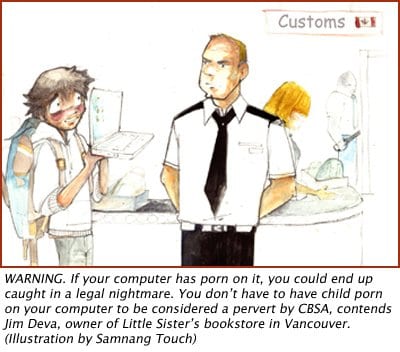When a 29-year-old Thunder Bay resident landed at the Ottawa International Airport on Jun 16, he became the subject of the fifth kiddie porn seizure at that airport this year.
Police would only say that “digital images” were allegedly found in the possession of Za Uk Ling, who was arriving from Malaysia. The Ottawa High Tech Crime Unit is now involved in the investigation.
More people are being charged at the airport than ever before, according to Chris Keeley from the Canada Border Services Agency (CBSA).
That’s because the Ontario Provincial Police have been training CBSA officers in how to use their special powers of search and seizure to find porn on traveller’s laptops and other media. In contrast to the police, the CBSA does not require judicial oversight in the form of search warrants in order to conduct searches.
“Since then, we have absolutely identified more of it, more often,” says Keeley.
CBSA officers do more thorough searches — of laptops, cell phones, portable hard drives and digital cameras — than they used to, according to Martin Dompierre a forensic examiner with the High Tech Crimes Unit of Ottawa Police Services.
“The only thing that has changed is that officers feel more confident in doing laptop searches,” says Dompierre.
“We will do a search of the laptop,” says Keeley. “And when we find an image we feel meets the requirements of the definition of child pornography, we stop searching. Then they [the local police or OPP] tend to be the ones who do the full forensic investigation.”
If a CBSA officer finds a stash of porn on a laptop, they may quickly survey the material: looking at between one and a dozen images. Or they could look at every graphic image looking for one with a participant that is arguably under the age of 18.
The degree of scrutiny a passenger gets depends on a number of factors: physical appearance, “how they present themselves,” their travel itinerary and their baggage status, Keeley says.
If you’re coming back from a country known for having fewer sex laws, that also puts you under the microscope, says Dompierre.
Or if you’re a gay man, adds Jim Deva.
Deva is the owner of Little Sister’s bookstore in Vancouver. His store has waged a twenty year battle against the CBSA and its predecessor, Canada Customs, to fight their systematic harassment of imported material bound for gay and lesbian bookstores in Canada.
Deva points out that most people — especially gay men — have some explicit images on their laptops.
“And as soon as they see sexually explicit material on your computer, you are considered by them to be a pervert,” he says.
The result: by carrying porn over the border you risk having your laptop seized for a month. Or worse, since the combination of gay explicit material and an innocuous photo of your niece or nephew stored in a completely different folder could land you in the middle of a criminal investigation, says Deva.
The CBSA targeted gays, the Supreme Court Of Canada ruled in 2000, in its treatment of Little Sister’s and other gay bookstores. Since then, things haven’t improved, says Deva. He flatly denies that the CBSA is competent to handle gay men’s laptops impartially.
And even if you’re diligent, if you identify as gay, you could end up caught in the system, he warns.
“You may think that an image that your friend sent you that you delete immediately isn’t on your computer any more, but it is,” warns Deva.
That’s because when you delete a file from your computer, you’re usually only deleting the digital equivalent of the library catalogue card, not the book itself.
There is software widely available to remove traces of deleted files. Some are marketed directly at porn users, some at people or companies with specific security concerns. Most tech-savvy gay men will at least encrypt their porn with a program like TrueCrypt, which is open source freeware.
Robin Sharpe, whose trail would become one of Canada’s most important freedom of expression cases, was sparked by a charge laid at the Canada-US border. Sharpe went all the way to the Supreme Court to test Kim Campbell’s slapdash 1993 porn law which forbade the possession fictional accounts and drawings depicting sex with someone under the age of 18.
“It’s an extremely dangerous thing to have happen. People really need to debate whether they need to take their personal laptops with them when they’re travelling,” says Deva.


 Why you can trust Xtra
Why you can trust Xtra